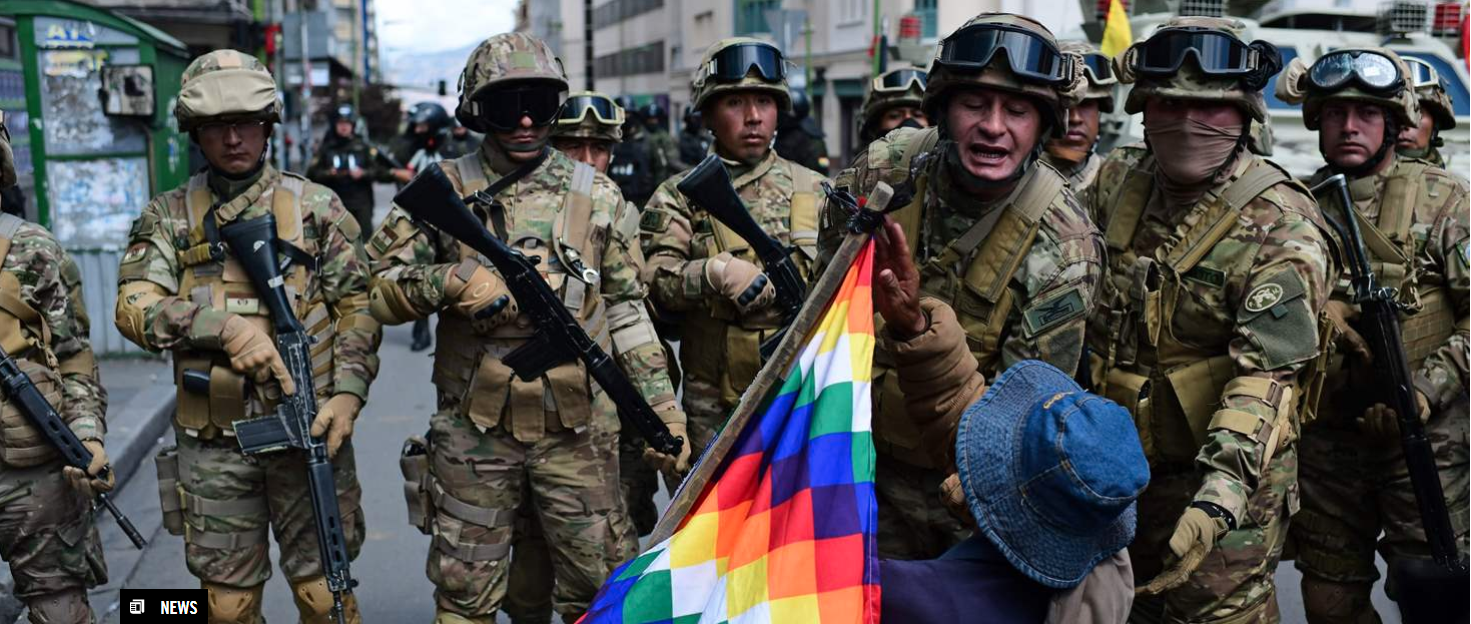The Bolivian authorities must immediately repeal Decree 4078 of 14 November 2019 and ensure that the security forces act in accordance with international rules and standards on the use of force and protect the human rights of all protesters irrespective of their political opinions, Amnesty International said today.
“The grave human rights crisis that Bolivia has experienced since the elections of 20 October has been aggravated by the intervention and action of the security forces. Any message giving carte blanche for impunity is extremely serious. The disastrous historical precedents of intervention by the Armed Forces in the region require maximum observance and commitment to respect and protect human rights”, said Erika Guevara-Rosas, Americas director at Amnesty International Americas.
Decree 4078, which has not yet been published in the country’s Official Gazette, provides for the participation of the Armed Forces in “the defence of society and maintenance of public order, in support of the National Police forces” and exempts from criminal responsibility Armed Forces personnel participating in operations to re-establish internal order and public security “when, in carrying out their constitutional duties, they act in legitimate defence or out of necessity, while observing the principles of legality, absolute necessity and proportionality”.
Amnesty International expresses its concern about this decree, which allows possible human rights violations and crimes under international law committed by members of the Armed Forces to go unpunished. The same decree states that the situation “is tending to deteriorate and move towards civil war.” This opens the way for acts of violence to be treated with impunity.
The organization recalls that security force personnel are not only required to account for their actions and omissions individually, but that superior officers may be held criminally responsible if they issue illegal orders, supervise, instruct or control them in any other way, or are responsible for planning and preparing operations that result in human rights violations and crimes under international law.
The current social, political and human rights crisis in Bolivia runs the risk of deteriorating if the authorities continue to respond in a violent manner to criticism, protests, media scrutiny and violence by third parties.
“The extremely tense social situation cannot be an excuse for the security forces to act contrary to International human rights standards, nor to encourage the wave of hate and racial discrimination that has hit the country in recent days. Jeanine Añez, who has proclaimed herself interim president, is duty-bound to immediately stop human rights violations or be ready to be held accountable by national and international mechanisms”, said Erika Guevara-Rosas.
In this context, the authorities must guarantee access to public, accurate and up-to-date information about people who have been killed, wounded or deprived of their freedom during the crisis that began on 20 October of this year. According to the Inter-American Commission on Human Rights, 23 people have died and 715 have been injured since that date.
Amnesty International calls on the authorities to conduct prompt, thorough and impartial investigations of these deaths as well as of allegations of human rights violations by the security forces and acts of violence against individuals. It is also essential to ensure that journalists and human rights defenders can carry out their important and legitimate work free of censorship, stigmatization and attacks.
The organization is concerned about the attacks and harassment denounced by journalists and human rights defenders, as well as by accusations of “inciting unrest” made by the Minister of Communications against journalists. We remind the government that only the judiciary has the power to determine criminal responsibilities.
Finally, Amnesty International notes that the current situation is directly interfering with the population’s means of subsistence. The organization has received reliable information indicating that the city of La Paz is surrounded without access to petrol or gas, resulting in a scarcity of food and intensifying the crisis.
For more information and to arrange an interview, contac: Lucy Scholey, Media Relations, Amnesty International Canada (English branch), 613-744-7667, ext. 236, lscholey@amnesty.cat






















